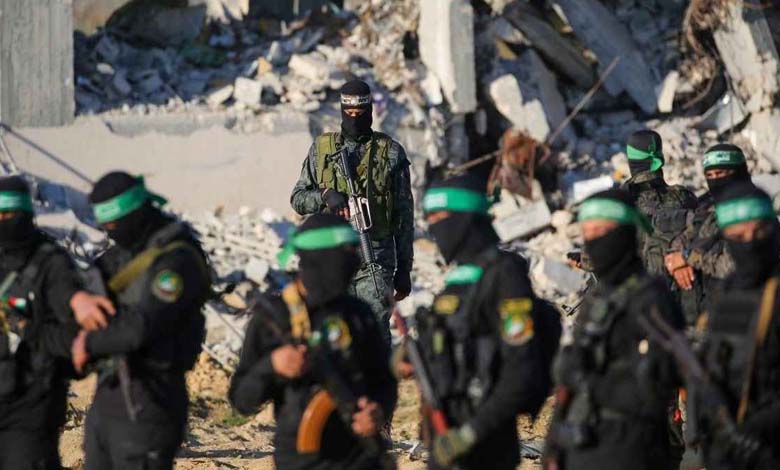Hamas bullets dictate the ceasefire in Gaza… as international pressure mounts for disarmament

In Gaza’s streets, a pressing question arises: can violence and executions truly create stability? With the ceasefire still in effect, Hamas security forces have returned, clashing with armed groups and killing individuals it claims are “gang members” or “collaborators with Israel.”
The movement, weakened after two years of Israeli warfare targeting its leaders at home and abroad, describes these actions as an “attempt to restore law and order” in areas vacated by the Israeli army.
-
Trump hails the dawn of a historic new era in the Middle East
-
Hamas executions in Gaza: consolidation of power or elimination of rivals?
But such displays of force, according to the Associated Press, may “endanger the truce” agreed upon under U.S. President Donald Trump’s plan, which secured the release of all surviving hostages and the continued return of bodies in exchange for Israel freeing around two thousand Palestinian prisoners.
Israeli Prime Minister Benjamin Netanyahu has repeatedly stated that the war will not end without Hamas being dismantled. He has hinted that military operations would resume if Hamas does not disarm voluntarily.
Trump’s ceasefire plan calls for Hamas to disarm and hand authority over to an internationally supervised body, not yet established. Hamas, however, has not fully
-
Hamas begins purging militias accused of collaborating with Israel
-
After the Arrest of a Hamas Cell in Berlin: The Brotherhood’s Danger Infiltrates Europe
accepted these conditions, insisting that more negotiations are required. The group says it is willing to transfer power to other Palestinians but refuses to allow “chaos” during the transitional period.
Israelis fear that as long as Hamas remains armed, it will continue to exert influence in Gaza—and potentially rebuild its military capabilities—even if an independent authority is formally in charge.
On Tuesday, Trump stated that Hamas had eliminated “two very bad gangs,” killing several of their members, adding: “It didn’t bother me too much, to be honest with you.” Still, he reiterated his demand that Hamas disarm: “They will lay down their arms, and if they don’t, we will disarm them. It will happen quickly, and perhaps violently.”
-
Who are the four key prisoners in the anticipated exchange deal between Hamas and Israel?
-
Hamas and the Muslim Brotherhood: A Persistent Security Threat to Europe
Security collapse and public executions
Since violently seizing Palestinian Authority institutions in 2007, Hamas has ruled Gaza with an iron fist, suppressing its rivals. Yet in recent months, its security forces largely disappeared as Israeli troops advanced.
To fill the vacuum, influential families and armed groups stepped in, accused by Hamas of stealing aid for profit—an allegation they deny.
Over the weekend, Hamas fighters clashed with a militia linked to the powerful Doghmush family after Mohammed Aql, a Hamas activist, was killed on Friday. The family said he had been kidnapped and murdered by the group.
-
Curfew and Clashes: Hamas Attacks the al‑Majayda Family in Gaza, Deepening Residents’ Suffering
-
Trump’s Plan and Hamas’s Response: Points of Convergence and Divergence
The clashes left about twenty people dead, including group leader Hossam Doghmush, a local activist, and the son of a senior Hamas official living abroad.
Pro-Hamas Telegram channels claimed the movement was targeting “collaborators and traitors” working with Israel.
Hamas’s security unit known as “Sahm” released footage appearing to show its fighters executing eight men in the streets, describing them as gangsters.
-
Trump’s Plan for Gaza: Hamas Leader Reveals Timeline for Movement’s Response
-
Trump’s Deadline for Hamas Nears Its End… Gaza’s Displaced Caught Between Hardship and the Inability to Escape
What about Hamas’s rivals?
The Al-Mezan Center for Human Rights in Gaza and the Palestinian Independent Commission for Human Rights both condemned Hamas’s extrajudicial killings. The Doghmush family also denounced the group’s response, calling it unnecessary “brutality.”
Meanwhile, Gaza’s Hamas-run Ministry of Interior announced a one-week amnesty, allowing gang members uninvolved in bloodshed to surrender and clear their records, warning that those who refuse will face arrest and trial.
This warning was rejected by Hossam al-Astal, leader of an anti-Hamas group in southern Gaza. On Facebook, he wrote: “To all Hamas rats: your tunnels have been destroyed, your rights no longer exist. Repent before it’s too late—Hamas no longer exists.”
-
Refusal to Apologize for the Cost of War: Senior Hamas Official Distances Himself from Gaza Civilians’ Suffering
-
Recruitment, Tunnels, and Surprises: Israeli Intelligence Unveils Hamas’s Plans
Al-Astal, once imprisoned by Hamas, founded an armed faction in late 2023 operating in Israeli-controlled areas. He now appears to have allied with Yasser Abu Shabab, leader of a similar group in Rafah, which Hamas accuses of looting aid during the war.
Israel has admitted supporting Abu Shabab and others opposing Hamas, while denying involvement in aid theft.
Analysts suggest these anti-Hamas factions may complicate ongoing negotiations over the group’s disarmament. Hamas has reportedly expressed willingness to surrender heavy weapons such as missiles to a Palestinian or Arab authority but insists on keeping light arms like rifles for self-defense, according to Arab officials cited by the Associated Press.












